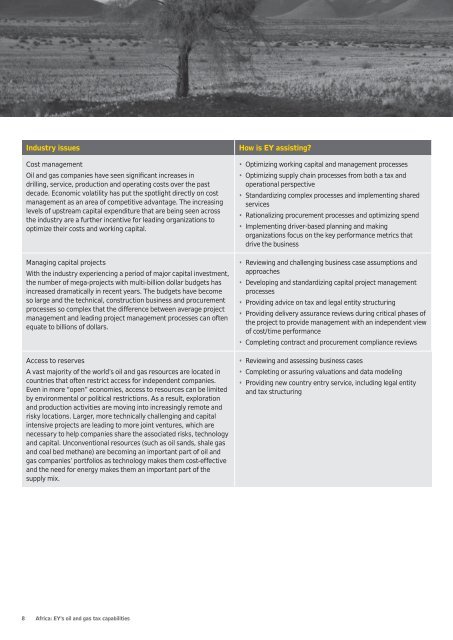xNmYh
xNmYh
xNmYh
You also want an ePaper? Increase the reach of your titles
YUMPU automatically turns print PDFs into web optimized ePapers that Google loves.
Industry issues<br />
Cost management<br />
Oil and gas companies have seen significant increases in<br />
drilling, service, production and operating costs over the past<br />
decade. Economic volatility has put the spotlight directly on cost<br />
management as an area of competitive advantage. The increasing<br />
levels of upstream capital expenditure that are being seen across<br />
the industry are a further incentive for leading organizations to<br />
optimize their costs and working capital.<br />
Managing capital projects<br />
With the industry experiencing a period of major capital investment,<br />
the number of mega-projects with multi-billion dollar budgets has<br />
increased dramatically in recent years. The budgets have become<br />
so large and the technical, construction business and procurement<br />
processes so complex that the difference between average project<br />
management and leading project management processes can often<br />
equate to billions of dollars.<br />
Access to reserves<br />
A vast majority of the world’s oil and gas resources are located in<br />
countries that often restrict access for independent companies.<br />
Even in more “open” economies, access to resources can be limited<br />
by environmental or political restrictions. As a result, exploration<br />
and production activities are moving into increasingly remote and<br />
risky locations. Larger, more technically challenging and capital<br />
intensive projects are leading to more joint ventures, which are<br />
necessary to help companies share the associated risks, technology<br />
and capital. Unconventional resources (such as oil sands, shale gas<br />
and coal bed methane) are becoming an important part of oil and<br />
gas companies’ portfolios as technology makes them cost-effective<br />
and the need for energy makes them an important part of the<br />
supply mix.<br />
How is EY assisting?<br />
• Optimizing working capital and management processes<br />
• Optimizing supply chain processes from both a tax and<br />
operational perspective<br />
• Standardizing complex processes and implementing shared<br />
services<br />
• Rationalizing procurement processes and optimizing spend<br />
• Implementing driver-based planning and making<br />
organizations focus on the key performance metrics that<br />
drive the business<br />
• Reviewing and challenging business case assumptions and<br />
approaches<br />
• Developing and standardizing capital project management<br />
processes<br />
• Providing advice on tax and legal entity structuring<br />
• Providing delivery assurance reviews during critical phases of<br />
the project to provide management with an independent view<br />
of cost/time performance<br />
• Completing contract and procurement compliance reviews<br />
• Reviewing and assessing business cases<br />
• Completing or assuring valuations and data modeling<br />
• Providing new country entry service, including legal entity<br />
and tax structuring<br />
8 Africa: EY’s oil and gas tax capabilities


